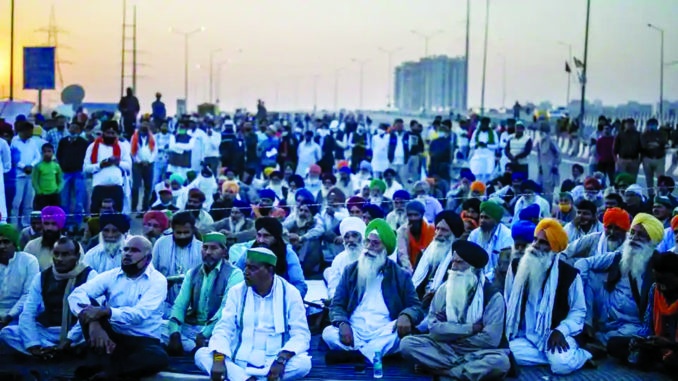
New Delhi (TIP): Farmers on Wednesday, Dec 9, rejected government’s proposal over the farm laws and called for a nationwide sit-in protest on December 14.
In a press conference, farmer leaders announced a ‘Delhi gherao’ plan saying that Delhi-Jaipur and Delhi-Agra highways will be blocked by the protesters by December 12 and all tolls across the country will be freed.
A representative group of farmer unions on Wednesday received a draft proposal from the government on some key concerns raised by the protesters.
Top sources in the government said the key amendments being proposed in the bills are an attempt to provide a tangible proposal to a number of unions along with the protestors who are not adamant on repealing the bills and have been pursuing reasonable demands.
The Centre’s proposals came after a four-hour meeting between 13 farm unions and the Government side led by Home Minister Amit Shah on Tuesday night.
‘Old proposal dressed up as new’
The All India Kisan Sangharsh Coordination Committee (AIKSCC) released a statement on government’s proposal on Wednesday and termed them “old proposals dressed up as new”.
“Modi govt insincere & arrogant about resolving farmers demands; all farmers bodies rightly reject old proposals dressed up as new. AIKSCC and all farmer organisations reiterate their demand to repeal 3 farm acts and EB 2020 . Protest to continue, more farmers to join in, in Delhi. District level dharnas to start in all states [sic], ” the release stated. The release further mentioned that the National Working Group of AIKCC met on Wednesday morning and took some decisions. “AIKSCC joins farmers organisations in denouncing & rejecting the so-called insincere and arrogant so-called ‘new’ proposal of Central govt [sic],” it said.
“AIKSCC calls upon farmers organizations to organize continuous sit-ins in all districts and state capitals, jointly with other supporting organizations at public places [sic],” it added
It further said, “Bharat Bandh on 8 December has proven beyond doubt all-India footprint of the popular farmers protests; AIKSCC congratulates all sections of society for support. AIKSCC notes mass participation in Bharat Bandh and calls upon all organizations and political parties to mobilize Farmers March in to Delhi to intensify protest [sic]”.
Call for nationwide protests
Farmer leader Prahalad Singh Bharukheda said that there is nothing new in government’s proposal and added that farmers will continue their protest against three agri-marketing laws.
Another farmer leader, Shiv Kumar Kakka, said that that protesting farmers might take a call on crossing Singhu border to enter Delhi in coming days.
The Samyukt Kisan Morcha also issued a press release and said that the farmer leaders have rejected the written proposal of the Central government, adding that all farmer leaders are adamant that the government repeals the three farm laws and brings the MSP Guarantee Act.
Why are farmers sticking to their stand?
Farm unions have stuck to their demand of scrapping three pro-market agricultural laws they say will hurt their livelihoods, dealing a blow to the Union government’s offer to bring changes to the laws to end weeks of agitation by farmers.
On Wednesday, the farm ministry sent out a lengthy set of proposal to farm unions protesting at Delhi’s borders to address their concerns. Farmers fear losing out to big corporations if private traders get a free in deregulated markets. The government says the changes will give farmers greater market access and spur investments.
The agriculture sector employs half of all Indians, but adds only 16% to the country’s gross domestic product (GDP), meaning far too many people are engaged in agriculture than is required to generate the same levels of farm incomes. The new laws allow businesses to freely trade farm produce outside, permit private traders to stockpile large quantities of essential commodities for future sales and set new rules for contract farming.
Concessions offered by the government provide for more oversight of private markets. Farmers, however, say they want nothing short of a full repeal of the laws. Farmers have come to trust decades-old regulated markets despite studies that show these markets are run by trader cartels who rig prices and lend money to farmers, limiting their bargaining power.
Yet, these markets also offer farmers assured minimum prices for staples, providing a sense of security. The new reforms allow corporations to operate with minimal regulations.
“The core concerns [are] about removing regulation on traders and companies and thereby removing all protections to farmers offered by the regulation system,” said Kirankumar Vissa of the Rythu Swarajya Vedika, a farm activist.
The government on Wednesday said its concessions will protect farmers’ bargaining power. Farmers say the very objective of the laws is wrong. “The crux of the matter is that the government’s laws are centered around large corporations which are against the interest of farmers and consumers. Why can’t markets be farmer-led?” said Kavitha Kuruganti of the Alliance for Sustainable and Holistic Agriculture, a farm activist who took part in the recent talks with the government.
Economists attribute India’s impressive economic growth over the years to reforms in industry, currency markets and manufacturing. The burst of reforms initiated in 1991 sidestepped the farm sector altogether.




Be the first to comment